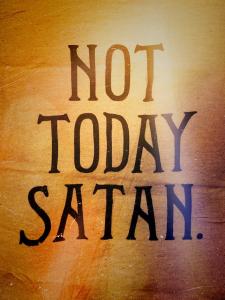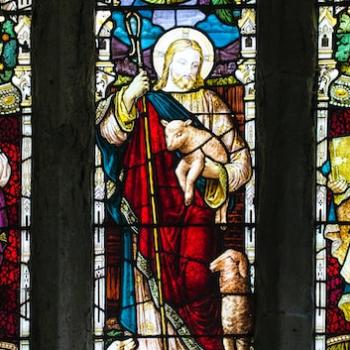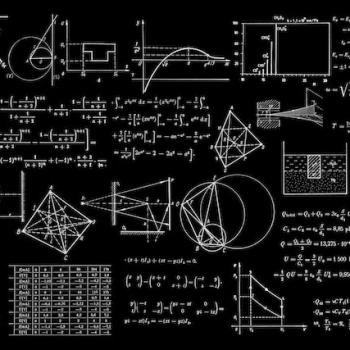Wednesday of Holy Week invites us to explore what we mean when we speak of Satan.

Ah, language! Miracle and menace all at the same time. My Palm Sunday post began my Holy Week quest to grapple with language as one of today’s most significant impediments to religious faith. The next day I wrote my Monday of Holy Week post in which I proposed understanding “humanity” and “divinity” as two modes of the same experience rather than binary opposites. Then yesterday, I used the gospel reading for Tuesday of Holy Week to delve into the possibility of updating our definition of “God” in a way that makes sense in the modern world today.
Hold the phone. Of course, any “definition of God” is a contradiction in terms, an impossibility. If we can define God, then it’s not God we’ve defined. If God is the Ground of Being, the sacred, dynamic unity from which absolutely everything is an individual manifestation, then God must be beyond anything we can conceive of intellectually. The part is a piece of the whole, but by definition, any part can’t be the whole in its entirety.
A Word on Words
As Buddha wisely said, “The finger pointing at the moon is not the moon.” Any definitions we come up with point fingers at ultimate truth but aren’t the truth itself. But we need to give it a shot, however insufficient our definitions are. Humans need labels and categories and definitions to make sense of the world.
The gospel reading for Wednesday of Holy Week recalls yesterday’s story of Jesus identifying Judas as his betrayer. Yesterday’s passage provided its own explanation for why Judas chose to hand Jesus over to the authorities. “After Judas took the morsel, Satan entered him” (John 13:27). And in today’s passage, Jesus goes on to say that “It would be better for that man if he had never been born” (Matthew 26:24). Ouch.
How are we to understand who or what Satan is?
The Catechism of the Catholic Church has this explanation: “Behind the disobedient choice of our first parents [Adam and Even] lurks a seductive voice, opposed to God, which makes them fall into death out of envy. Scripture and the Church’s Tradition see in this being a fallen angel, called ‘Satan’ or the ‘devil.’ The Church teaches that Satan was at first a good angel, made by God. ‘The devil and the other demons were indeed created naturally good by God, but they became evil by their own doing'” (Catechism 391).
The U.S. Catholic Conference of Bishops has doubled down on this understanding by publishing Rebuking the Devil, a collection of Pope Francis’ teachings on the Devil published in 2019. The USCCB’s The Devil is Real announcement identified the book’s content: “The history of the devil, his empty promises and works, and how we can actively combat him.”
Words Have Consequences
Oh, my. If I don’t believe that God is a male, supernatural Puppeteer-in-Chief, then I certainly can’t believe that an angel fell from grace, grew horns and a tail, and occasionally left the fires of hell to “enter” people and made them evil.
Throughout human history, if no clear evidence-based explanation for something existed, we created them ourselves based on what we knew at the time. We had to come up with some way of understanding why suffering is a part of human life. We needed to blame evil on someone or something. Just as we attributed life’s “good parts” to a supernatural God, we attributed the “bad stuff” to a supernatural Enemy. Enter Satan.
Most contemporary theologians recognize this language as personification. We use figurative language to convey truths that the human mind struggles to comprehend in literal terms. However, the language of the Church continues to invite literal interpretations.
Words on the Wednesday of Holy Week
Isn’t it time to update the anthropomorphic shorthand that does far more harm than good to Christianity? The “nones” make up the largest religious denomination today because the ancient language of faith no longer aligns with established science and our lived experience. Today, good and evil supernatural beings make sense on the big screen in a Marvel epic, not the altar at Church.
So, if there’s no literal Satan, then where does evil come from? I don’t have a satisfying answer, but it works for me. I think Life just is. No one is in the control tower pressing buttons and turning dials. No one is choosing what will happen to me, you, and everyone else.
Life is Life and does what Life does: grow and wither, build and destroy, evolve and atrophy. Life ignites and extinguishes, invites and rejects, blooms and withers. Language limits my ability to convey this clearly, but the only way I know how to describe it is to say that Life is Life and does what Life does. This is the truth the writer of Ecclesiastes described in the Old Testament a few centuries BCE. “A time to weep, and a time to laugh; a time to mourn, and a time to dance. A time to scatter stones, and a time to gather them; a time to embrace, and a time to be far from embraces” (3:4-5).
Isness
Life just is. At first blush, that might be the best news. If life is merely “a stage, and all the men and women merely players,” as Jacque in Shakespeare’s As You Like It suggests, then life doesn’t sound like much to get excited about. It is less so when we consider that it ends in “mere oblivion, sans teeth, sans eyes, sans taste, sans everything” (Act 2, Scene 7).
I believe that contemplating such a destiny is how we came up with the concept of “heaven.” If the last chapter of our brief time on Earth is “sans everything,” then we reason there must be some prize or reward beyond the grave waiting for us if we’ve made the cut.
There are no literal supernatural good and bad guys in the Chess Match of Existence in which we serve as pawns. Consequently, there can be no literal heaven in the clouds with angels and harp music nor a literal hell down below with eternal flames and the cries of the doomed.
Against that backdrop, saying “Life just is” sounds almost nihilistic. But don’t be fooled. Just because the language of this “finger” is simple and possibly scandalous doesn’t mean the “moon” to which it points is not profoundly spectacular.
Words and Waves
Let’s look at it differently. If we all come from the same source, draw our breath and fill our dance cards within it, and then return to it when we are “sand teeth, sans eyes, sans taste, sans everything,” then we have something to celebrate! This means that we aren’t just a tiny boat on the ocean that has its day in the sun but eventually ends up in pieces at the back of the shipyard. Instead, each of us is one of the waves. We bubble up into our crest, fly through the air in an exhilarating rush, crash loudly upon the shore . . . and then return to the watery womb from which we came.
We come from the ocean. We return to the ocean. We are the ocean.
Deceptively Good News
What amazing news! That means that even when low tide calls my wave back into its watery depth, I am still the ocean. Granted, I do not have – and never can have – any idea of what that will look like. But it’s the only explanation that makes sense to me, and I find it comforting. More than that really . . . to be the ocean! How wonderful!
This week I proposed some updates to our understanding of crucial religious terms to reclaim the essence of Christian truth for today’s world: humanity, divinity, God, Satan, heaven, and hell. As we continue toward Calvery this week, we’ll tackle other challenging terms like prayer, sin, and salvation. Stay tuned!
















